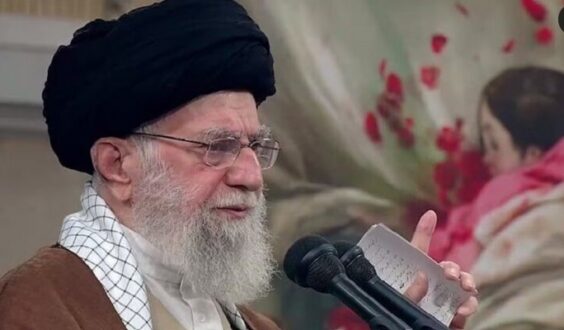RFL/RE -For decades, Iran’s clerical establishment has used voter turnout in elections as proof of its legitimacy, especially to the outside world.
But with anti-establishment sentiment among the public rising and unprecedented protests erupting against the authorities in recent years, the legitimacy of Iran’s rulers has been severely undermined.
That has coincided with record-low turnouts in recent presidential and parliamentary elections. Now, as Iranians prepare to go to the polls on March 1, the authorities have been urging the public to vote amid fears of another poor turnout.
Sanam Vakil, the director of the Middle East and North Africa Program at the London-based think tank Chatham House, said the clerical establishment is “facing a legitimacy crisis,” adding that the authorities “can’t hide it anymore without stuffing the ballots.”
Given the widening gulf between the ruling clerics and Iran’s young population as well as ongoing state repression and economic mismanagement, the authorities “cannot be surprised” by a record-low turnout next week, said Vakil.
Iranians will cast their ballots for parliamentary elections as well as vote for the Assembly of Experts, which picks and nominally oversees the work of the country’s supreme leader.
Ali Vaez, the director of Iran Project at the International Crisis Group, argues that “the regime has reached a stage where it has given up on the majority of the Iranian people, who for their part have given up on the regime.”
“The leadership only cares about one thing: a smooth succession of the supreme leader even if that comes at the cost of the system’s legitimacy,” he added.
Purging The System
Even as the authorities have pleaded with the public to vote in the upcoming elections, they have also severely limited the playing field, disqualifying many reformist and moderate candidates.
That trend started in 2021, when the ultraconservative Ebrahim Raisi, a close ally of Supreme Leader Ayatollah Ali Khamenei, was elected as president. Since then, Iran’s hard-liners have dominated all three branches of the government: the presidency, parliament, and judiciary.
“There has clearly been a gradual shift under way to purge the system of critics as part of the slow-motion political transition we are watching,” said Vakil.
This is particularly evident in the elections for the Assembly of Experts, whose 88 members are elected on eight-year terms. Media reports suggest 105 out of the 144 candidates are backed by hard-liners, while 39 are running as independents.

Former President Hassan Rohani, a moderate, was disqualified from running in the Assembly of Experts vote.
The main task of the assembly is to appoint the next supreme leader. Given Khamenei is 84, it is likely the next assembly will pick his successor.
“The system clearly doesn’t want to leave anything to chance,” said Vaez, although he added Khamenei’s successor will likely be chosen “by the deep state” comprising Khamenei’s office and the powerful Islamic Revolutionary Guards Corps, the elite branch of Iran’s armed forces.
“The Assembly of Experts will just rubber-stamp that decision,” said Vaez.
‘Dismal Turnout’
The mass disqualification of moderate and reformist candidates ahead of the 2020 parliamentary elections and the 2021 presidential vote contributed to the poor turnouts, experts said.
But that was before the unprecedented unrest that engulfed Iran in 2022 during monthslong anti-establishment protests.
The demonstrations were triggered by the death in custody of Mahsa Amini, a 22-year-old woman who was arrested for allegedly wearing her mandatory hijab improperly.

The nationwide protests began as a rebuke against the brutal enforcement of the hijab, a key pillar of the Islamic republic. But they soon snowballed into one of the most sustained demonstrations against Iran’s theocracy, with some protesters calling for an end to clerical rule and demanding their social and political freedoms.
At least 500 protesters were killed and thousands were detained in the state’s brutal crackdown on the protests. Nine protesters have so far been executed for their role in the rallies following trials described as unfair by rights groups.
Observers said the protests will likely have a significant influence on turnout in the upcoming elections.
“It defies logic for an unfree and unfair election that comes on the heels of a brutal suppression of dissent to witness a higher participation rate than the dismal turnout of the last parliamentary elections,” Vaez said.

Even if moderates and reformists were allowed to run in this year’s elections, it would not make a difference because “that is not the core issue for most Iranians anymore,” said Holly Dagres, a nonresident senior fellow at the Atlantic Council.
“It won’t make much of a difference in the outcome of the election because reformists in the past have been unable to deliver on their promises,” she said. “Many Iranians see them as an extension of the problem: the Islamic republic, which they are since they are part of the system.”
But that has not stopped the authorities from calling on the public to vote.
“We must all take part in the elections…. The correct way to fix and resolve problems is through elections,” Khamenei said on February 18, echoing remarks he had made in previous weeks.
Officials have also tried to encourage voting by suggesting that not doing so would play into the “enemy’s” hand.
The calls are unlikely to convince nonvoters, said the pro-reform newspaper Hammihan, which suggested the authorities were pleading with “people whose voices were not heard” in the 2022 protests.
 Shabtabnews In this dark night, I have lost my way – Arise from a corner, oh you the star of guidance.
Shabtabnews In this dark night, I have lost my way – Arise from a corner, oh you the star of guidance.



